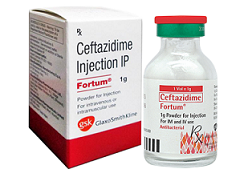Coronavirus Antivirals: Chinese Researchers Identify The Antibiotic Ceftazidime As A Possible Antiviral Candidate To Inhibit SARS-CoV-2 Infections
Source: Coronavirus Antivirals Sep 17, 2020 4 years, 7 months, 1 week, 2 days, 13 hours ago
Coronavirus Antivirals: Researchers from University of Chinese Academy of Sciences, Shanghai-China have identified the antibiotic Ceftazidime as possible antiviral candidate to inhibit SARS-CoV-2 coronavirus and treat the COVID-19 disease.

The research findings were published on a preprint server and have yet to be peer reviewed.
https://www.biorxiv.org/content/10.1101/2020.09.14.295956v1
The study team after screening more than 3,500 U.S.FDA-approved drugs and small molecules found that ceftazidime, an antibiotic approved for use in treating pneumonia, binds to the receptors that the SARS-CoV-2 coronavirus binds to in human cells. Hence this drug could potentially be used to prevent virus infection.
It is already known that the coronavirus has proteins, called spike proteins, which jut out from its surface. A portion of the proteins has areas called receptor binding domains (RBDs) that can bind to receptors of the angiotensin-converting enzyme 2 (ACE2) found on the host cells. Once the RBDs bind to the ACE2 receptors, the virus can fuse with the host cell membrane and infect the cell.
There are a multitude of strategies for fighting the virus infection, some of which rely on preventing the virus from binding to the host cell receptors. For example, many monoclonal antibodies have been developed that target the spike protein of the virus.
Most of these strategies cannot be deployed immediately as they need to undergo large scale trials for efficacy and safety in humans, which have long timelines. Furthermore, the cost of monoclonal antibodies is very high, which may prevent its widespread use.
An easier approach to combat the virus is to figure out if drugs already approved for other diseases may work against SARS-CoV-2 a process known as drug repurposing.
As most of these drugs are already approved for use in humans with safety data already in place, their use can be almost immediate after proving that they do indeed work in preventing COVID-19.
Banking on this idea, the study team screened 3,581 small molecules from the FDA Approved Drug Library, Spectrum Collection, and Targetmol Natural Compound Library using a high throughput screening method, AlphaScreen.
The researchers purified RBDs and attached them to acceptor beads and the purified extracellular part of ACE2 to donor beads. When the RBDs bind to ACE2, the acceptor beads come close to the donor beads. Upon shining light of 680 nm wavelength, there is emission in the 520–620 nm region. A higher signal indicates greater affinity. If the small molecules screened prevent binding of the donor and acceptor beads, or lower signal, this indicates successful inhibition of binding of the RBDs to the ACE2 receptors.
Using this AlphaScreen platform the study team initially identified 75 compounds after the first round of screening, showing at least 45% inhibition.
The team further shortlisted 10 compounds through a refined method.
Of these ten molecules, which included bleomycin sulfate, levodopa, norepinephrine, trientine hydrochloride, ceftazidime, chiniofon, hematein, theaflavin,
bleomycin, and myricetin,
ceftazidime showed the highest potential and potency with a relative inhibition rate of about 81%.
The drug Ceftazidime is a type of cephalosporin antibiotic. It is an antibiotic generally used to treat bacterial pneumonia and is considered safe except for persons with allergic reactions to cephalosporins.
Further detailed testing of ceftazidime found that it binds specifically and firmly to the spike proteins RBDs, but not the ACE2 extracellular domain. This was appositive signs as it showed that it would not harm or interfere with human cells in any way.
Interestingly Ceftazidime also prevented binding of the coronavirus RBDs to the human pulmonary alveolar epithelial cells or lung cell that also express ACE2.
In addition, ceftazidime also prevented the entry of the SARS-CoV-2 pseudovirus, an alternative to the natural virus with similar infectivity, into cells expressing the human ACE2.
The tema found that the concentration of ceftazidime required for 50% inhibition, or the IC50, was about 113 µM, and it did not show any measurable toxicity up to 400 µM.
Typically in the treatment of pneumonia, the ceftazidime blood concentration can reach 300 µM.
The study team says that at this concentration, ceftazidime showed 96% inhibition of SARS-CoV-2 pseudovirus infection in vitro.
Aside from ceftazidime, the study team also tested 14 other cephalosporins, such as cephradine and cefazolin. However, only ceftazidime inhibited the binding of SARS-CoV-2 to ACE2.
The researchers think that the action of ceftazidime is because of the chemical functionalities of 2-aminothiazole, oxime with a terminal-exposed isobutyric acid, and the positively charged pyridine. These moieties could be interacting with the spike protein RBDs, preventing binding on the virus to the ACE2 receptors. The strong binding of ceftazidime to the RBDs suggests covalent bonding.
As a result of the promising study findings, the study team suggests that ceftazidime should be considered for the treatment of COVID-19, especially as it is already approved, is safe, and affordable. Also, modifications of the chemical structure of the molecule could also be investigated to improve its inhibitory action further.
The team is exploring working with institutions in Brazil, India and the Middle-East to start proper human clinical trials to test the efficacy of the drug which can then be repurposed.
For more on
Coronavirus Antivirals, keep on logging to Thailand Medical News
